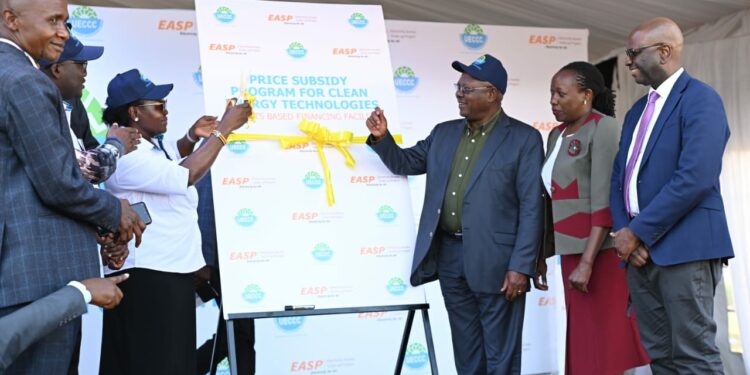Kiboga, December , 2024: The Government of Uganda through Ministry of Energy and Mineral Development and Energy Credit Capitalisation Company (UECCC) has officially launched its Results-Based Financing/Price Subsidy (RBF) Programme as part of the Electricity Access Scale-up Project (EASP).
The launch, which took place on Thursday, December 5, 2024, at Kiboga District Administration Grounds, comes just a month after UECCC announced a partnership with Energy Service Companies (ESCOs) to extend price subsidies for clean energy technologies.
The programme, funded by Government of Uganda and World Bank, will run until June 30, 2027, and is aimed at increasing access and adoption of clean energy through financial support for clean cooking solutions, off-grid solar technologies for households and enterprises, as well as access to on-grid and off-grid productive use technologies to support business development and productive applications.
The official launch, presided over by the Minister of Energy and Mineral Development, Hon. Dr. Canon Ruth Nankabirwa, was graced by community members, local and government leaders, UECCC officials, World Bank representatives, ESCOs, who had some of their products (subsidised) on display and the financial institutions that partner with ESCOs.
The programme seeks to make clean energy affordable and accessible to rural households, vulnerable groups, and refugee-hosting communities, reaching both urban and rural areas. To achieve this, UECCC has partnered with 67 ESCOs and these will use market-based approaches to deliver the price subsidies to Ugandans and refugees. The companies will sell their products as they ordinarily do, and buyers will pay for the chosen items at the discounted prices. To ensure quality service provision, the companies in question are all certified by UNBS.
UECCC Managing Director Roy Nyamutale Baguma noted that the company is well positioned to pool resources from the government and development partners and to channel the same to catalyse financing for the development and implementation of renewable energy projects and access.
“We also intermediate through leasing companies, investment funds, and more importantly, the energy service companies dealing in the various clean energy technologies. UECCC’s interventions are designed to respond to government policies, including all the national development plans and priority programmes towards increasing access to electricity for lighting, clean cooking, and productive uses of energy,” Baguma said.
A digital platform developed with German based firm, A2AI (Access to Energy Institute) will facilitate transparency and efficiency in processing claims and payments. The platform is integrated with National Identification and Registration Authority Uganda (NIRA) and plans to connect with mobile payment systems for seamless transactions.
According to Hon. Nankabirwa, government has new strategies in place to approach the challenges in the power sector and the RBF is one of them. This includes private sector participation both in existing operations as well as the financing and management of investments in the power sector.
“For emphasis, UECCC has extended lines of credit to 18 financial institutions to support end-user financing and working capital loans to energy service companies. And as by 2023, the company had enabled 1,350,000 Ugandans to access clean energy, including solar, biogas, and commercial on-grid connections,” Hon. Nankabirwa noted.
“I have now been informed that 42 financial institutions expressed their interest to participate in the financial intermediation of the electricity access scale-up project component being implemented by UECCC.
Similarly, I have also been informed that 125 energy service companies expressed interest in partnering with UECCC for this very project,” Hon. Nankabirwa added.
Nankabirwa noted that the programme will equally contribute to the National Electrification Strategy of having 50 per cent of Ugandans expected to be connected on-grid and 50 per cent using off-grid solutions by 2030.
Joseph Kapika Senior Energy Specialist at the World Bank says that they proud to support this programme, which aligns with their mission to promote sustainable development.
“By reducing the upfront cost of solar systems, clean cooking technologies, and productive energy equipment, we are empowering communities to improve their livelihoods, health, and economic opportunities,” he noted.
The RBF programme covers a wide range of technologies in three categories:
Off-Grid Solar Products (OGS): This includes solar lamps, home systems, and other solar-powered devices. Subsidies will cover up to 60% of the cost for solar lanterns and 50% for solar home systems.
Clean Cooking Solutions (CCS): Subsidies ranging from 30% to 50% will be offered for various cookstoves, biogas solutions, and electric cooking devices, helping households transition to cleaner cooking methods.
Productive Use of Energy (PUE): Solar-powered water pumps, refrigerators, grain milling machines, and on-grid devices for small businesses will benefit from a 60 per cent price reduction.
Eligibility and Access
Ugandan citizens are eligible for the program by presenting a valid National Identity Card. Refugees living in Uganda’s refugee-hosting districts can also access these subsidies with a valid Refugee Identity Card.
The programme will be facilitated by a network of energy service companies that have been pre-qualified to supply the subsidized products.
Following the launch, UECCC will hold regional awareness campaigns to highlight the benefits of adopting clean energy.
Beneficiaries can visit the UECCC website, https://www.ueccc.or.ug/ for a list of participating companies.
Do you have a story in your community or an opinion to share with us: Email us at editorial@watchdoguganda.com










